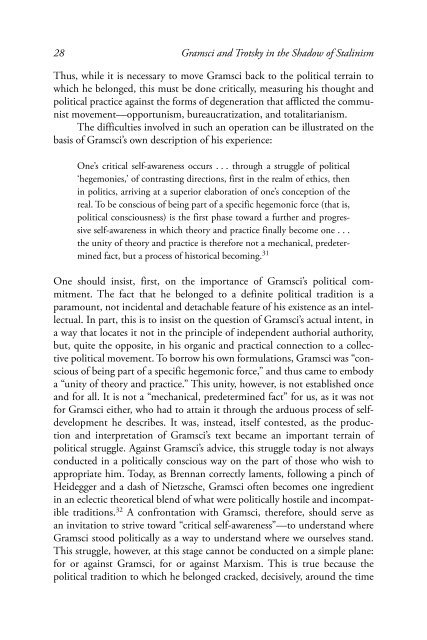Gramsci and Trotsky in the Shadow of Stalinism: The ... - Indymedia
Gramsci and Trotsky in the Shadow of Stalinism: The ... - Indymedia
Gramsci and Trotsky in the Shadow of Stalinism: The ... - Indymedia
- No tags were found...
Create successful ePaper yourself
Turn your PDF publications into a flip-book with our unique Google optimized e-Paper software.
28 <strong>Gramsci</strong> <strong>and</strong> <strong>Trotsky</strong> <strong>in</strong> <strong>the</strong> <strong>Shadow</strong> <strong>of</strong> Stal<strong>in</strong>ismThus, while it is necessary to move <strong>Gramsci</strong> back to <strong>the</strong> political terra<strong>in</strong> towhich he belonged, this must be done critically, measur<strong>in</strong>g his thought <strong>and</strong>political practice aga<strong>in</strong>st <strong>the</strong> forms <strong>of</strong> degeneration that afflicted <strong>the</strong> communistmovement—opportunism, bureaucratization, <strong>and</strong> totalitarianism.<strong>The</strong> difficulties <strong>in</strong>volved <strong>in</strong> such an operation can be illustrated on <strong>the</strong>basis <strong>of</strong> <strong>Gramsci</strong>’s own description <strong>of</strong> his experience:One’s critical self-awareness occurs . . . through a struggle <strong>of</strong> political‘hegemonies,’ <strong>of</strong> contrast<strong>in</strong>g directions, first <strong>in</strong> <strong>the</strong> realm <strong>of</strong> ethics, <strong>the</strong>n<strong>in</strong> politics, arriv<strong>in</strong>g at a superior elaboration <strong>of</strong> one’s conception <strong>of</strong> <strong>the</strong>real. To be conscious <strong>of</strong> be<strong>in</strong>g part <strong>of</strong> a specific hegemonic force (that is,political consciousness) is <strong>the</strong> first phase toward a fur<strong>the</strong>r <strong>and</strong> progressiveself-awareness <strong>in</strong> which <strong>the</strong>ory <strong>and</strong> practice f<strong>in</strong>ally become one . . .<strong>the</strong> unity <strong>of</strong> <strong>the</strong>ory <strong>and</strong> practice is <strong>the</strong>refore not a mechanical, predeterm<strong>in</strong>edfact, but a process <strong>of</strong> historical becom<strong>in</strong>g. 31One should <strong>in</strong>sist, first, on <strong>the</strong> importance <strong>of</strong> <strong>Gramsci</strong>’s political commitment.<strong>The</strong> fact that he belonged to a def<strong>in</strong>ite political tradition is aparamount, not <strong>in</strong>cidental <strong>and</strong> detachable feature <strong>of</strong> his existence as an <strong>in</strong>tellectual.In part, this is to <strong>in</strong>sist on <strong>the</strong> question <strong>of</strong> <strong>Gramsci</strong>’s actual <strong>in</strong>tent, <strong>in</strong>a way that locates it not <strong>in</strong> <strong>the</strong> pr<strong>in</strong>ciple <strong>of</strong> <strong>in</strong>dependent authorial authority,but, quite <strong>the</strong> opposite, <strong>in</strong> his organic <strong>and</strong> practical connection to a collectivepolitical movement. To borrow his own formulations, <strong>Gramsci</strong> was “conscious<strong>of</strong> be<strong>in</strong>g part <strong>of</strong> a specific hegemonic force,” <strong>and</strong> thus came to embodya “unity <strong>of</strong> <strong>the</strong>ory <strong>and</strong> practice.” This unity, however, is not established once<strong>and</strong> for all. It is not a “mechanical, predeterm<strong>in</strong>ed fact” for us, as it was notfor <strong>Gramsci</strong> ei<strong>the</strong>r, who had to atta<strong>in</strong> it through <strong>the</strong> arduous process <strong>of</strong> selfdevelopmen<strong>the</strong> describes. It was, <strong>in</strong>stead, itself contested, as <strong>the</strong> production<strong>and</strong> <strong>in</strong>terpretation <strong>of</strong> <strong>Gramsci</strong>’s text became an important terra<strong>in</strong> <strong>of</strong>political struggle. Aga<strong>in</strong>st <strong>Gramsci</strong>’s advice, this struggle today is not alwaysconducted <strong>in</strong> a politically conscious way on <strong>the</strong> part <strong>of</strong> those who wish toappropriate him. Today, as Brennan correctly laments, follow<strong>in</strong>g a p<strong>in</strong>ch <strong>of</strong>Heidegger <strong>and</strong> a dash <strong>of</strong> Nietzsche, <strong>Gramsci</strong> <strong>of</strong>ten becomes one <strong>in</strong>gredient<strong>in</strong> an eclectic <strong>the</strong>oretical blend <strong>of</strong> what were politically hostile <strong>and</strong> <strong>in</strong>compatibletraditions. 32 A confrontation with <strong>Gramsci</strong>, <strong>the</strong>refore, should serve asan <strong>in</strong>vitation to strive toward “critical self-awareness”—to underst<strong>and</strong> where<strong>Gramsci</strong> stood politically as a way to underst<strong>and</strong> where we ourselves st<strong>and</strong>.This struggle, however, at this stage cannot be conducted on a simple plane:for or aga<strong>in</strong>st <strong>Gramsci</strong>, for or aga<strong>in</strong>st Marxism. This is true because <strong>the</strong>political tradition to which he belonged cracked, decisively, around <strong>the</strong> time
















